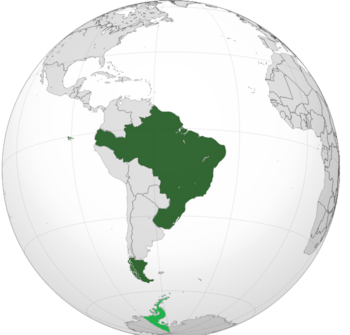Esenia
This article is incomplete because it is pending further input from participants, or it is a work-in-progress by one author. Please comment on this article's talk page to share your input, comments and questions. Note: To contribute to this article, you may need to seek help from the author(s) of this page. |
Empire of Esenia Império de Essênia | |
|---|---|
| Motto: TBA TBA | |
 | |
| Capital | River of January (Rio de Janeiro) Saint Paul (São Paulo) |
| Official languages | English, Portuguese |
| Ethnic groups (2023) |
|
| Demonym(s) | Esenian |
| Government | Federal consitutional monarchy |
| Legislature | TBA |
| Population | |
• 2023 census | 229,546,116 |
| GDP (nominal) | 2023 estimate |
• Total | $9.815 trillion |
• Per capita | $42,759 |
| Gini (2023) | 37.9 medium |
| HDI (2023) | very high |
| Currency | Cruzeiro (C$) |
| Date format | mm-dd-yyyy |
Esenia (Portuguese: Essênia), officially the Empire of Esenia (Portuguese: Império de Essênia), is a country located in South America. It is the only nation in South America to share a coastline with both the Atlantic and Pacific Oceans besides Colombia. Esenia is bordered by all other countries in South America and covers roughly half of the continent's land area, making it the largest country in Latin America. It is one of the few nations in the New World with a monarchy. Esenia is the third largest economy in the world as well as the world's seventh most populous country. Due to over a century of mass immigration from around the globe, it is one of the world's most multicultural and ethnically diverse nations, as well as the most populous Roman Catholic-majority country in the world. Esenia's Amazon basin is home to the world's largest and best known tropical rainforest, featuring diverse wildlife, a variety of ecological systems, extensive natural resources, and numerous habitats protected by federal law. This unique environmental heritage makes Esenia a megadiverse country and the most biodiverse country in the world.

